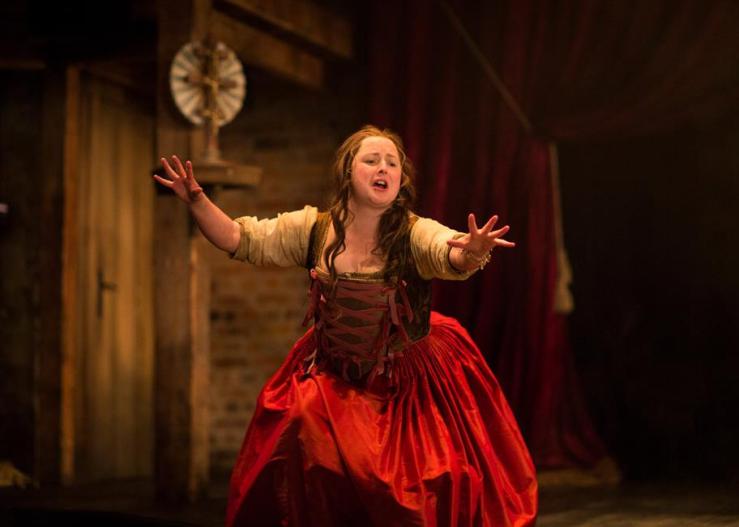 Photo by Helen Maybanks.
Photo by Helen Maybanks.
(Original post at The Boar)
Polly Findlay has staged a raucous, playful production of The Alchemist, Ben Jonson’s esteemed city comedy.
A play of many transformations, The Alchemist is centred around a “venture tripartite” of confidence tricksters. Face (Ken Nwosu), otherwise known as Jeremy, is a butler to the nobleman Lovewit. With his master fleeing London after an outbreak of the plague, Face transforms the gentleman’s house into a den of iniquity for himself and his accomplices.
Subtle (Mark Lockyer), a fellow conman, takes up the titular mantle of alchemist and convinces Face’s marks that he can revolutionise their lives, be it through their material greed for the philosopher’s stone or their sexual fantasies for nubile young widows. Mediating between the two men is Doll Common (Siobhán McSweeney), a prostitute and skilled grifter who occupies a vital role in the crew, but is belitted by her partners in crime.
Each actor in the trio has their chance to shine. Nwosu has a natural charm that translates well to Face, the fixer and schmoozer of his high class marks. Lockyer cuts a mercurial figure whilst conning, but gives Subtle genuine pathos in the play’s final scenes. McSweeney is perhaps my favourite: her Doll is more sensible than her cohorts, but she nevertheless maintains an entertaining presence onstage.
The production’s supporting cast form a parade of unsympathetic victims. The vain, the selfish, and the intemperate of London all flock to Lovewit’s house to quench their impossible desires.
Particular highlights include a lengthy monologue from the aptly named Sir Epicure (Ian Redford) that is sensual and depraved, and the unhinged physical comedy from Tom McCall as Kastril, who’s a noisy delight to watch.
Like the Swan’s recent production of Doctor Faustus, the text has been thoroughly pared back, with around 20% of the text cut by editor Stephen Jeffreys. The result is a tightly plotted comedy without the waffle, letting the characters devolve into chaos and back again without ever seeming messy.
My one complaint? Chekhov’s gun dictates that the stuffed crocodile suspended from the ceiling should have fallen on someone. I want my crocodile-based humour, and I want it now.
Findlay’s comedy is set in period, which makes a refreshing change. That’s not to say the modern world doesn’t occasionally creep into the production- Corin Buckeridge’s overture alludes to famous thrillers and heist movies, from Mission Impossible to The Sting. There’s something universally satisfying about tricking greedy, foolish characters that makes Jonson’s satire endlessly relevant.
Perhaps that’s why I found the play’s ending rather sad; I couldn’t help but want the trio to succeed. Ultimately, not even the con artists can escape the fraud and hedonism that pervade the house. Undone by Face and Subtle’s rivalry over an attractive widow, and by the untimely return of Lovewit, the venture tripartite is driven apart. Face betrays his crew to save his position as Lovewit’s butler, and the bitter fury Subtle and Doll direct at him as they leave is genuinely moving. Face, it seems, is experiencing guilt over his actions for the first time.
Jonson’s play famously ends with Face’s apology to the audience. Findlay’s production takes this further and has Nwosu perform some mental maths, adding up the ticket prices of everyone in the room before the cast re-emerge, out of costume, to take their bows. It’s a cheeky way of reminding us that theatre’s all smoke and mirrors, that we’ve readily given away our hard earned funds to watch a kind of deception. Yet watching the cast of The Alchemist perform farce at its finest feels as remarkable as seeing metal turned to gold.